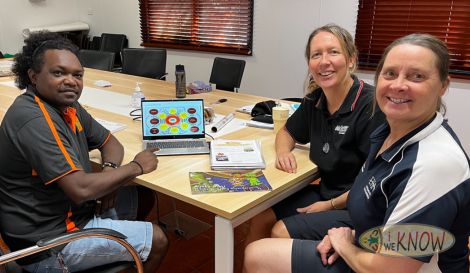Griffith University’s iKnow weKnow Project Named Top 30 Finalist in GlobalCall24
An innovative, Australian-first collaborative research project is co-designing resilient water and energy management solutions with Aboriginal and Torres Strait Islander communities.
The iKnow weKnow project, led by Griffith University through a three-year Australian Research Council Linkage grant, has partnered with eight water and energy industry organisations and four remote Indigenous communities across Queensland, Northern Territory and Western Australia.
And now the project and the team have been recognised with the selection as one of the top 30 finalists for the Falling Walls Engagement category of the GlobalCall24.
This recognition brings the team a step closer to being celebrated among the Science Breakthroughs of the Year at the prestigious Falling Walls Science Summit 2024, taking place in November.
This year’s Falling Walls Global Call received more than 1,100 nominations from over 300 different institutions, showcasing innovative scientific advancements and impactful initiatives across various fields.
The project explores locally and culturally appropriate communication and education tools to support community members in managing their water and energy use wisely and managers to incorporate local experiences and knowledge into their decision making.
Using genuine co-design processes to develop digital and in-person engagement and education tools, the project aims to enhance climate, energy, and water security and sustainability over the long term by addressing key barriers such as communication between service providers and water and energy users about the quality and supply of water and energy in as close to real-time as possible.
The project will:
- Assess and understand a whole-of-community baseline of water and energy systems in the four pilot communities.
- Co-design tools with community members that address key issues and support effective and efficient supply and use of water and energy.
- Test out and evaluate the co-designed tools with community members and evaluate their potential to improve how water and energy are managed in remote communities.
This ambitious endeavour merges local and Indigenous cultural knowledge with technical expertise and digital technologies.
By listening to, and working with, communities, the aim is to develop and support locally generated solutions to water and energy problems that will be more long-lasting and tailored to the unique setting of each community to secure water and energy resources in a climate-changed future.
Dr Melissa Jackson, a Research Fellow with the Griffith Climate Action Beacon and Cities Research Institute, said: “Many Australians would not be aware that Australians living in remote areas experience much poorer levels of service and quality of water than in regional and urban areas.
“‘iKnow weKnow’ has an underpinning philosophy where we work collaboratively on the ground with communities to tap into local knowledge and experiences to develop place-based solutions to the biggest water and energy challenges for residents, such as poor quality and high demand for water and power.
Dr Melissa Jackson
The iKnow weKnow project reflects this, developing empowerment of individuals (‘i) to make good choices in their homes and building collective action (‘we’) through cultural and scientific knowledge (‘Know’) about water and energy (‘we’).
“The “i” also plays on the digital focus of tools that are being explored to support in-person education and awareness raising – including an app and online resources that will be available for the pilot communities for the long term.
“In previous research, we discovered that a larger percentage of water in remote Aboriginal and Torres Strait Islander communities is used outdoors than in urban areas, up to 70% at some points. This is not just water waste or leaks, but often for cultural and family activities.
“Fishing and hunting are important cultural and food activities which require a lot of water to clean and prepare, often outdoors.
“Water is also used for health with a common use being watering unsealed roads and dirt areas to keep the dust out of indoor areas. Dust is a breathing hazard and people with asthma and other respiratory diseases are at risk so watering can reduce this risk.”
But a huge amount of water is also lost through leaks, both in poorly maintained publicly housing, and in the distribution system, where pipes and fittings can corrode rapidly with higher acidity water and extreme environments.
The project’s primary output will be an empirically tested, culturally appropriate, and user-friendly water-energy toolbox, which aims to address some of the key issues that communities are experiencing, including improving literacy about water and energy conservation, addressing and managing household leaks, improving drinking water quality and reducing household costs.
“By working in four diverse communities across our diverse country, we hope that the guidance and tools produced through this project are useful not only to the pilot communities but can be shared and replicated across remote Australia,” Dr Jackson said.

